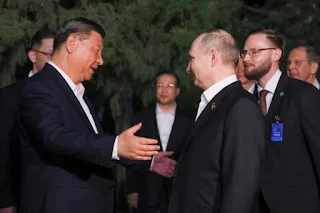null
Russian President Vladimir Putin arrived in Beijing on Thursday for a two-day state visit to China. This is Putin's 23rd visit to China, and China has become the first stop of his foreign affairs visit after he was re-elected as the Russian president.
Russian President Vladimir Putin arrived in Beijing on Thursday for a two-day state visit to China. This is Putin's 23rd visit to China, and China has become the first stop of his foreign affairs visit after he was re-elected as the Russian president.
Putin and Chinese leader Xi Jinping signed a joint statement on Thursday on deepening the comprehensive strategic partnership of coordination for a new era. This official document with more than 10,000 words announced to the outside world that China and Russia do not seek alliances, confrontation, or target third parties. However, they repeatedly named the United States and criticized its "hegemonic" behavior. In addition to deepening economic and trade cooperation between the two countries, Russia supports the "One China" principle and South China Sea interests. China has not condemned Russia's invasion of Ukraine, only saying that China and Russia have reached an agreement on a "political solution" to the Ukrainian crisis.
Putin flew from Beijing to Harbin on Thursday evening. According to the Russian Satellite News Agency, Putin not only laid flowers at the Harbin Soviet Red Army Martyrs Monument in Harbin, but also participated in official activities such as the opening ceremony of the Harbin Russia-China Expo.
According to online news, a local school in Harbin issued a notice asking parents to "instruct their children to be careful about their speech" and not to post any content related to Putin's visit on social media. The notice also warned, "Cybersecurity management is very strict and do not touch legal red lines."
Putin's visit was a grand occasion, and the official Xinhua News Agency's description was the most enthusiastic. The report said that Putin and Xi Jinping "warmly shook hands and took photos" and hugged twice; when the two met in a small area at Zhongnanhai, they "walked and talked, sat by the water and drank tea together." In accordance with Xi Jinping's previous public statements, state media described Putin's visit to China as a meeting with "old friends."
Not only that, on Weibo, China's largest social media platform, the comments of netizens under the major Chinese official media and government accounts that released news about Putin's visit to China have also been filtered, and only some content that conforms to the official narrative is publicly displayed.
Lin Shengliang, a Chinese dissident in the Netherlands, believes that the authorities are worried that a foreign policy that is too friendly with Russia will cause a backlash in public opinion. He said: "No one in the world except China would invite or welcome an international war criminal to this country with a grand ceremony. (China) is worried that someone will mention that he (Putin) is an international war criminal, or mention the past in Vladivostok."
Even so, Chinese officials still find it difficult to block the different voices in society regarding Putin's visit to China. Some Weibo netizens said: "I am Chinese, and as one of them, I do not welcome the war criminal Putin"; "Cats cry and mice fake mercy, international war criminals, eternal sinners!" Some netizens expressed the hope that Russia would return the occupied China's Far East. Regional territory.
Former Sina Weibo censor Liu Lipeng told this station that China has a long history of censoring foreign leaders online at sensitive times, but China censors the speeches of Russian President Vladimir Putin and North Korean leader Kim Jong-un the most. He said: "Putin's visit to China will be even more controversial. He is an international war criminal, and there are actually many voices of criticism within the wall. (Putin and Kim Jong-un) have a very bad reputation, and their notoriety will directly implicate the Chinese To criticize one’s own leader is to blame Xi Jinping.”
Liu Lipeng believes that the logic behind the Chinese authorities’ increased censorship of foreign leaders’ online speech is to not allow any potential questioning of China’s own official foreign policy.
At the beginning of this month, after Russian sociopolitical scientist Aleksandr Dugin, known as "Putin's Mentor" and "Kremlin Brain", opened an account on Weibo, his comment section also attracted condemnation and criticism from Chinese netizens.
According to Reuters, Putin will return to Moscow after his visit to Harbin on Friday. However, many international media analysts believe that Putin may make a "lightning" visit to North Korea on his return trip.






Xi and Putin working hand-in-hand.
ReplyDeleteWhy does Xi Jinping embrace Putin but strictly censor online public opinion?
ReplyDeleteGood
ReplyDeleteInformative
ReplyDeleteInformative
ReplyDelete